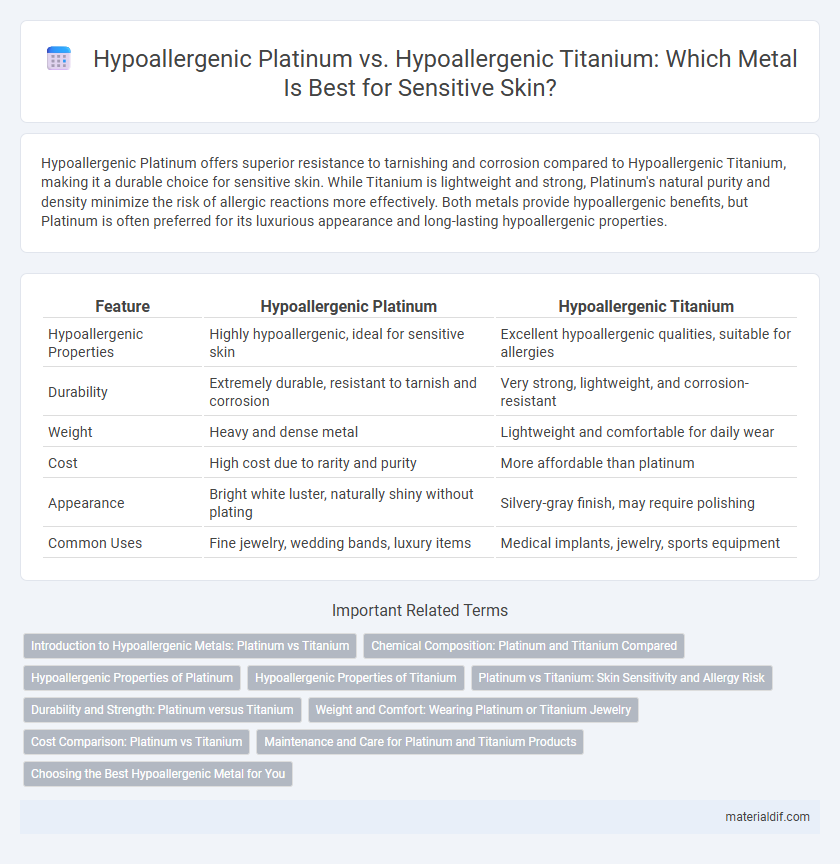Hypoallergenic Platinum offers superior resistance to tarnishing and corrosion compared to Hypoallergenic Titanium, making it a durable choice for sensitive skin. While Titanium is lightweight and strong, Platinum's natural purity and density minimize the risk of allergic reactions more effectively. Both metals provide hypoallergenic benefits, but Platinum is often preferred for its luxurious appearance and long-lasting hypoallergenic properties.
Table of Comparison
| Feature | Hypoallergenic Platinum | Hypoallergenic Titanium |
|---|---|---|
| Hypoallergenic Properties | Highly hypoallergenic, ideal for sensitive skin | Excellent hypoallergenic qualities, suitable for allergies |
| Durability | Extremely durable, resistant to tarnish and corrosion | Very strong, lightweight, and corrosion-resistant |
| Weight | Heavy and dense metal | Lightweight and comfortable for daily wear |
| Cost | High cost due to rarity and purity | More affordable than platinum |
| Appearance | Bright white luster, naturally shiny without plating | Silvery-gray finish, may require polishing |
| Common Uses | Fine jewelry, wedding bands, luxury items | Medical implants, jewelry, sports equipment |
Introduction to Hypoallergenic Metals: Platinum vs Titanium
Hypoallergenic metals like platinum and titanium are highly valued in jewelry manufacturing due to their low risk of causing allergic reactions. Platinum, a dense and naturally white metal, offers superior durability and a luxurious finish, making it ideal for sensitive skin and high-end pieces. Titanium, lighter and exceptionally strong, also resists corrosion and is often preferred for its affordability and hypoallergenic properties in medical and everyday wear.
Chemical Composition: Platinum and Titanium Compared
Platinum is a naturally hypoallergenic precious metal characterized by its stable chemical composition, primarily consisting of pure platinum (Pt) with minimal trace elements, reducing the risk of allergic reactions. Titanium, an element (Ti) known for its biocompatibility, forms a protective oxide layer that prevents metal ion release, making it hypoallergenic but chemically distinct from platinum's dense noble metal structure. While platinum resists corrosion and tarnish due to its inert nature, titanium's lightweight and strong oxide film offers corrosion resistance with a different chemical mechanism, influencing their performance in hypoallergenic jewelry and medical implants.
Hypoallergenic Properties of Platinum
Platinum demonstrates excellent hypoallergenic properties due to its inert nature, making it highly resistant to causing allergic reactions or skin irritation. Unlike some metals, platinum does not release nickel or other common allergens, which are typical triggers in sensitive skin cases. Its durability and biocompatibility position platinum as a superior choice for hypoallergenic jewelry and medical implants.
Hypoallergenic Properties of Titanium
Titanium is highly regarded for its exceptional hypoallergenic properties, making it an ideal choice for individuals with sensitive skin or metal allergies. Unlike some forms of platinum, titanium is biocompatible and rarely causes allergic reactions due to its inert nature and resistance to corrosion. This makes hypoallergenic titanium particularly popular for medical implants and jewelry where prolonged skin contact is common.
Platinum vs Titanium: Skin Sensitivity and Allergy Risk
Platinum is highly hypoallergenic, causing minimal skin sensitivity and allergic reactions due to its inert nature and resistance to corrosion, making it an excellent choice for sensitive skin. Titanium, also known for its biocompatibility, offers a lighter alternative with exceptional hypoallergenic properties, often preferred for individuals with metal allergies. When comparing allergy risk, platinum's dense molecular structure reduces the likelihood of ion release, whereas titanium's oxide layer prevents irritation, positioning both metals as top options for hypoallergenic jewelry and implants.
Durability and Strength: Platinum versus Titanium
Platinum offers exceptional durability and strength, making it highly resistant to scratches and everyday wear, ideal for long-lasting jewelry. Titanium, renowned for its superior strength and lightweight properties, provides excellent resistance to bending and corrosion while maintaining a lighter feel than platinum. Both metals are hypoallergenic, but platinum's density delivers a more substantial, enduring quality compared to the robust yet lighter titanium.
Weight and Comfort: Wearing Platinum or Titanium Jewelry
Hypoallergenic platinum offers a luxurious weight and dense feel, providing a substantial presence while remaining gentle on sensitive skin. Hypoallergenic titanium is significantly lighter, enhancing comfort for prolonged wear without compromising durability or causing irritation. Choosing between platinum and titanium depends on preference for either a heavier, premium feel or a lightweight, comfortable option suitable for everyday jewelry.
Cost Comparison: Platinum vs Titanium
Hypoallergenic platinum is significantly more expensive than hypoallergenic titanium due to its rarity and higher density, often costing up to five times more per gram. Titanium offers a cost-effective alternative while maintaining strong hypoallergenic properties, ideal for budget-conscious buyers. The price difference impacts jewelry and medical device production costs, with platinum reserved for premium applications.
Maintenance and Care for Platinum and Titanium Products
Platinum requires minimal maintenance due to its dense, non-porous nature, resisting tarnish and corrosion while developing a natural patina that enhances its luster over time. Titanium, known for its exceptional strength and hypoallergenic properties, demands simple cleaning routines to remove dirt and oils, maintaining its lightweight and durable surface. Both metals benefit from occasional professional polishing, but platinum's self-healing properties reduce the frequency of care compared to titanium's more resilient yet surface-scratched appearance.
Choosing the Best Hypoallergenic Metal for You
Hypoallergenic platinum and hypoallergenic titanium both offer excellent options for sensitive skin, with platinum being a naturally inert metal known for its durability and resistance to tarnish. Titanium is lightweight, highly corrosion-resistant, and often more affordable, making it a practical choice for those needing a hypoallergenic metal that balances comfort and strength. Choosing the best metal depends on personal preferences for weight, budget, and long-term wear, with platinum providing luxury and robustness, while titanium delivers lightness and cost-effectiveness.
Hypoallergenic Platinum vs Hypoallergenic Titanium Infographic

 materialdif.com
materialdif.com